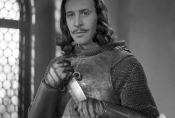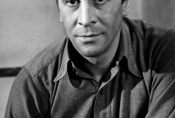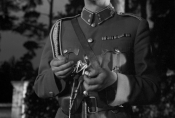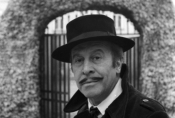Leon Niemczyk
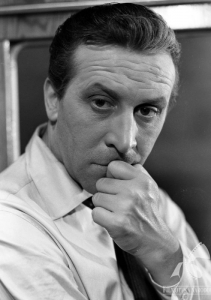
“I accept every part I am offered because I believe that you can do something good even with a minor, poorly written role. Moreover, there are no bad roles, there are only bad actors,” Niemczyk said in an interview for “Film” magazine (1985). The actor appeared in over 350 films and television series, mostly in supporting and cameo roles, although he also had several memorable performances as the principal character in films by directors such as Jerzy Kawalerowicz, Roman Polanski and Janusz Majewski.
He was born December 15, 1923 in Warsaw, died on November 29, 2006 in Łódź. During World War II, he served in the US Army. After the war he joined the touring Musical Comedy Theatre in Warsaw (1948) and then worked with other theatres, such as Wybrzeże in Gdańsk (1949) and the Ziemi Pomorskiej Theatre in Bydgoszcz (1950-1953). In 1952, he passed his extramural acting exams. In the years 1953–1979, he joined the Powszechny Theatre in Łódź. In 1979, he devoted himself exclusively to film and television.
He first appeared on screen as Major Stuposz in Celuloza/Cellulose (1953) by Jerzy Kawalerowicz, based on the famous novel by Igor Newerly. His first major roles were the Hungarian officer in Scherzo alla Polacca, the first episode in Eroica (1957) by Andrzej Munk, and “Nine,” one of the workers in Czesław Petelski’s adaptation of Marek Hłasko’s short story Baza ludzi umarłych/The Depot of the Dead (1958), set in a depot somewhere in Bieszczady, where a group of men rejected by society work with timber under extremely difficult conditions.
Ultimately, it was Kawalerowicz who offered him a leading part, casting him in the role of a passenger in Pociąg/Night Train (1959), a poignant study of human loneliness. Two people who have never met before – a man (Leon Niemczyk) and a woman (Lucyna Winnicka) – spend the night sharing a sleeping compartment. Too preoccupied with their own affairs, despite some chances that seem to open for them, they remain internally lonely.
Another excellent performance by Niemczyk came two years later in Roman Polanski's directorial debut (nominated for an Academy Award) – Nóż w wodzie/Knife in the Water (1961), a thriller about a well-off sports journalist, who travels with his wife to Mazury and decides to offer a lift to a young hitchhiker. It is an extremely bitter psychological drama exposing the characters of his heroes: the selfishness of the man (Niemczyk), the cynicism of the woman (Jolanta Umecka), and the smug arrogance of the boy (Zygmunt Malanowicz).
His next major role of this calibre came 44 years later in Po sezonie/Off season (2005) by Janusz Majewski, the charming story of a certain relationship. It is set in a Mazury hotel in January, at a time where there are no other tourists there. A young woman who comes there every year meets another guest – an elderly man... Niemczyk was supposed to play the main role in Jeszcze nie wieczór/Before Twilight (2008), Jacek Bławut’s beautiful tribute to old, wonderful actors. The director wrote the role of Jerzy with him in mind. Unfortunately, it was too late, and Bławut had to cast Jan Nowicki, who won the best leading actor award at the festival in Gdynia for his performance. Accepting the honour, he declared, “I thank you very much, but I am here only as a substitute for Leon.”
Niemczyk was an outstanding actor. Despite the fact that he played only a handful of main roles, he earned a permanent place in the memory of audiences. He knew how to create a memorable performance even with a minor role, such as Don Avadoro in Rękopis znaleziony w Saragossie/The Saragossa Manuscript (1964) by Wojciech Has, the gambler Stefan Mikun in Wielki Szu/Big Shar (1982) by Sylwester Chęciński, the engineer Midroń in the underrated Odwet/Revenge (1982) by Tomasz Zygadło, the barber Filip in Akademia Pana Kleksa [Mr Kleks’ Academy] (1983) by Krzysztof Gradowski, or as a patient at a home for the elderly and the chronically ill in Księga wielkich życzeń/The Book of Great Wishes (1997) by Sławomir Kryński.
In 1993, Marek Piestrak made a documentary dedicated to the actor, titled Zawodowiec/The Professional.
Selected filmography
-
1957
HEROISM (EROICA)
reż. Andrzej Munk
-
1958
THE DEPOT OF THE DEAD
reż. Czesław Petelski
-
1959
THE TRAIN (NIGHT TRAIN, BALTIC EXPRESS)
reż. Jerzy Kawalerowicz
-
1961
KNIFE IN THE WATER
reż. Roman Polański
-
1964
THE MANUSCRIPT FOUND IN SARAGOSSA
reż. Wojciech Jerzy Has
-
1981
GREAT RUN
reż. Jerzy Domaradzki
-
1982
BIG SHAR
reż. Sylwester Chęciński




